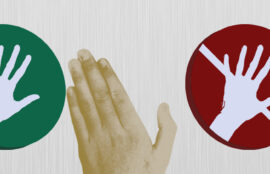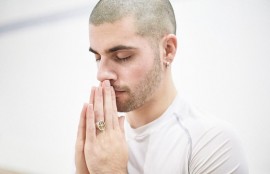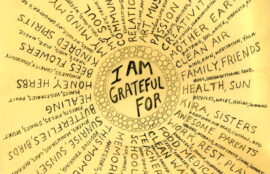 In approximately one month and 10 days, I’ll be on my way to making one of the larger decisions of my adult life (so far, anyway); I’m moving to Austin, Texas, approximately 2,000 miles and one hell of a road trip away from my family and almost my entire friend group back in New York. While I have many questions about my move—chief among them, “How much should a mattress cost?” and “Will everyone hate me for being a Brooklyn transplant?”—nothing has loomed larger in my mind than the question of friendship, or, more specifically, how a full-grown adult goes about making new friends with no partner or kids to act as built-in buffers.
In approximately one month and 10 days, I’ll be on my way to making one of the larger decisions of my adult life (so far, anyway); I’m moving to Austin, Texas, approximately 2,000 miles and one hell of a road trip away from my family and almost my entire friend group back in New York. While I have many questions about my move—chief among them, “How much should a mattress cost?” and “Will everyone hate me for being a Brooklyn transplant?”—nothing has loomed larger in my mind than the question of friendship, or, more specifically, how a full-grown adult goes about making new friends with no partner or kids to act as built-in buffers.
Of course, a big move is hardly the only circumstance in which an otherwise reasonably socialized adult might find herself craving new friendships. The COVID-19 pandemic shrunk our social circles considerably, with many of us spending the last year-plus in the company of family and only our absolute closest BFFs. As the world slowly reopens, it stands to reason that we might want to seek out new connections—and feel somewhat unsure about where to start (especially as COVID-19 rates continue to climb in many cities).
Anxiety about friend-making isn’t so uncommon, according to clinical psychologist and friendship researcher Dr. Miriam Kirmayer, although some of these nerves may be linked to misconceptions about how meaningful friendships actually come about. “There does seem to be, for many people, this belief that friendships should just happen—whether we’re in a new city or a new phase of life—and that our people, so to speak, will magically show up. As beautiful as that is, that isn’t the reality for most people,” explains Kirmayer. “My best advice is to be very intentional with how we approach making friends; seek out opportunities, experiences and activities where we are likely to meet new people with whom we share something in common. My second piece of advice is to try and choose wisely, or, in other words, choose opportunities where we will have more frequent interactions, because we know that friendships often require that frequency of interaction in order to develop.”
Conventional wisdom has it that you should pick popular yet slightly off-the-beaten path activities, like a running group or a knitting club, to meet new people. But what about those of us for whom a good Friday night hinges on the strength of a gummy edible and the availability of a new episode of The Bold Type on Hulu? I’m not trying to paint myself as a total couch potato, but…let’s just say my social style is definitely on the “chill” side, not so much the “go hiking and meet new people on top of a mountain at 7:00 a.m.” side. My quest for new friendships almost feels like dating, something I’m meh at yet very enthusiastic about, except that I don’t have a great frame of reference for what “success” would look like. Does friendship success equal a hangout invite? A standing Saturday-night bar crawl? Godparent-ing each other’s children? How will I know when I’ve cracked it, socially speaking?
For some people, social success—however they define it—can spring from a source as prosaic as social media. Mijal Tenenbaum, 27, moved to Los Angeles with only a few loose acquaintances at her disposal. She DM-ed one of them on Twitter and invited them out to brunch, and while that plan never came to be, Tenenbaum’s new friend did invite her to Disneyland, of all places. Today, the two are best friends, and Tenenbaum’s advice to people in similar situations (whether they’re in a new city or just feeling socially stagnant) would be: “If you get good vibes from an acquaintance or Twitter mutual, reach out and give them a chance! Even if you’re a little insecure and you don’t know them well, just go for it.”
 For Hannah Smith, 27, friendship began at home—quite literally—when she moved to San Francisco in 2019 without knowing anyone. Smith sublet three different rooms through Craigslist before she finally signed a month-to-month lease in the perfect place (which she also found through Craigslist), eventually turning a roommate from her final apartment into one of her best friends. “Low-commitment living situations can be a great way to get to know people in a new place,” says Smith, although she adds that this strategy might be somewhat complicated by the ongoing effects of COVID-19.
For Hannah Smith, 27, friendship began at home—quite literally—when she moved to San Francisco in 2019 without knowing anyone. Smith sublet three different rooms through Craigslist before she finally signed a month-to-month lease in the perfect place (which she also found through Craigslist), eventually turning a roommate from her final apartment into one of her best friends. “Low-commitment living situations can be a great way to get to know people in a new place,” says Smith, although she adds that this strategy might be somewhat complicated by the ongoing effects of COVID-19.
One popular method for friend-making endorsed by Kirmayer is volunteering, which is exactly how Courtney Gustafson, 31, ended up meeting her two best friends. “During the pandemic, I happened upon a colony of feral cats, started caring for them, made them an Instagram, and then two different people reached out to offer help with the cats,” says Gustafson. “The three of us turned out to be around the same age and have a lot in common, and now we are a cat rescue/best friend team of 3!”
Ultimately, there’s no perfect way to predict the success of a new friendship. After all, you could join a volunteer effort or a cooking club and meet absolutely nobody you bond with, or you could meet your all-time, Elena Ferrante–novel–level soulmate at a random party you almost skipped. Still, as more people get vaccinated and life ever-so-creepingly returns to “normal,” it’s worth thinking about whether the friendships in your life are giving you what you need and want. If they’re not, maybe you should DM that cool-seeming Twitter person, sublet with a friendly acquaintance, or bond over a mutual love of feral cats—because after all, without true and lasting friendships, who would have the courage tell us when we were being annoying on the internet?
Original article here






















Sorry, the comment form is closed at this time.